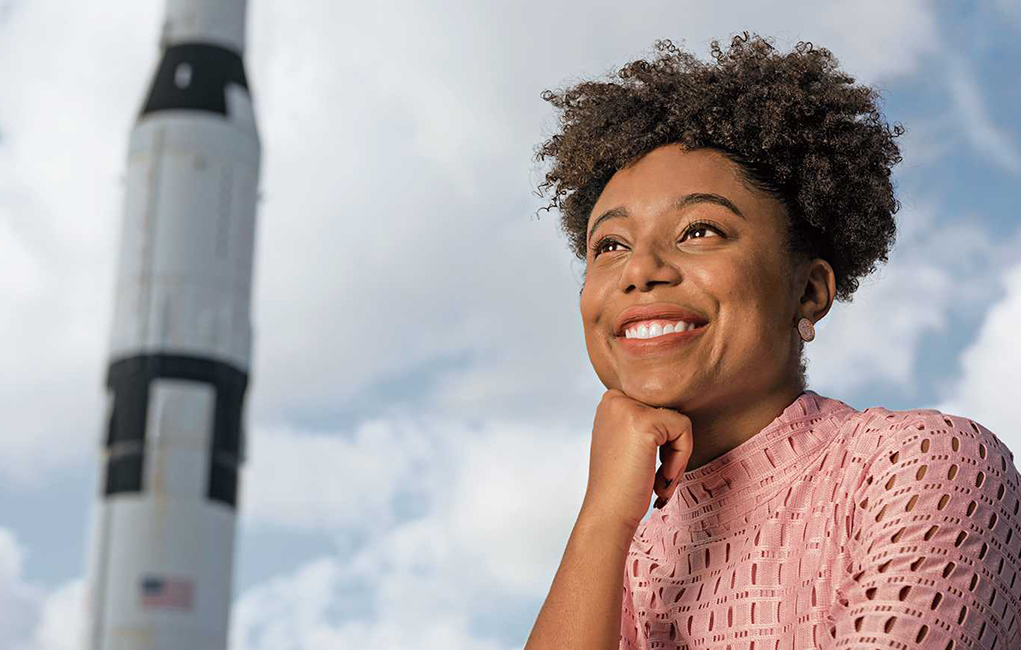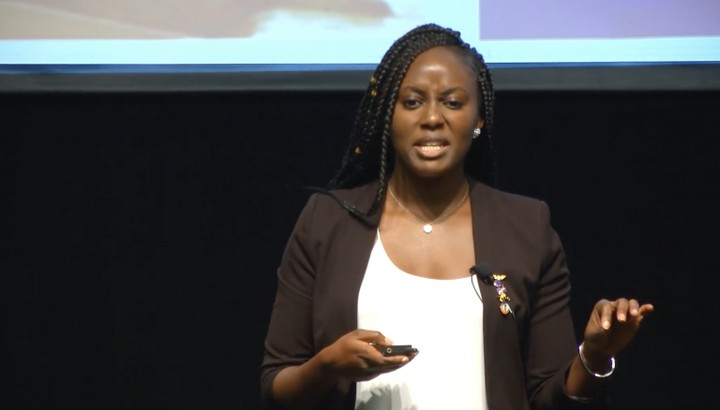Tiera Guinn Fletcher is an African American engineer who graduated from MIT in 2017 and works for Boeing. She is one of the designers and structural analysts building the Space Launch System for NASA which is set to send people to Mars.
Fletcher was born in the greater Atlanta area in Georgia. Her interest and attraction to math and science began at the age of six and was cultivated by her parents. Her mother Sheila, was an accountant and her father was a construction worker. Her parents encouraged her to calculate things and measure things in her daily life. These exercises – including coupon clipping, totaling up grocery receipts, and learning about the applications of architecture – challenged Fletcher and set her apart from other kids her age. At eleven years old, Fletcher zeroed in on her interest in Aerospace engineering while participating in an aerospace program put on by Lockheed Martin. Fletcher went on to study aerospace in college at MIT.
Fletcher lives in New Orleans, Louisiana where she works on the assembly of the Space Launch System. She was married in July 2018 to Myron Fletcher, another aerospace engineer who also works at Boeing. Both she and her husband share an interest in influencing young people to join the world of STEM along with increasing the diversity of STEM fields.
Fletcher attended Wheeler High School in Marietta, Georgia. During her senior year of high school, Fletcher received an internship at NASA in Langley, Virginia. She also landed a research internship at the Georgia Institute of Technology in 2014. The internship involved assisting in the research of landing performance in aircraft. Through these internships her interest in the field grew and she solidified her choice in pursuing aerospace engineering as a major in college and an eventual career.

Fletcher attended Massachusetts Institute of Technology (MIT) and graduated with a 5.0 GPA and received her Bachelor’s of Science in Aerospace Engineering in June 2017. She participated in a mentorship program to help other students at MIT, this helped instil confidence in herself and her capabilities.
After her first year, Fletcher participated in undergraduate research studying design optimization of aircraft at MIT. Her second year, she again participated in undergraduate research, this time studying Network Analysis. During her junior and senior years of college, Fletcher participated in two different internships at Boeing. From June 2015 to June 2016 Fletcher was a Systems Engineering Intern at Boeing where she helped design, test, and collaborate with other professionals on Boeing products. The following year from June 2016 to June 2017 Fletcher was a Design engineer and Stress Analyst Intern at Boeing where she helped with the design process and analysis of the Space Launch System for NASA.
Fletcher was offered a job at Boeing as a Structural analysisEngineer. At Boeing, she is one of the lead engineers and designers working on the Space Launch System for NASA which aims to put humans on Mars. The Space Launch System is the fastest rocket ever created and the largest. The area that Fletcher works on is the exploratory upper stage of the spacecraft which helps the craft complete its ascent phase. She is part of the Engine Section Task Leading team responsible for this, of which she is the youngest member.
Fletcher received the 2017 Good Housekeeping‘s Awesome Woman Award which recognizes women who are impacting the world for the better by overcoming social constraints and influencing the world around them.
Also in 2017, Fletcher received the Albert G. Hill Prize at MIT which recognizes students in their junior or senior year who have excelled academically and impacted the environment at MIT in a way that improves campus climate for other minorities.
In June 2018, Fletcher participated as a keynote speaker at Impact’18 in Krakow – where speakers discuss innovations and business models to share with the world what work they are doing.
On November 8, 2018, Fletcher won the Most Promising Engineer – Industry Award at the 2019 Black Engineer of the Year Awards.
Source: Wikipedia

